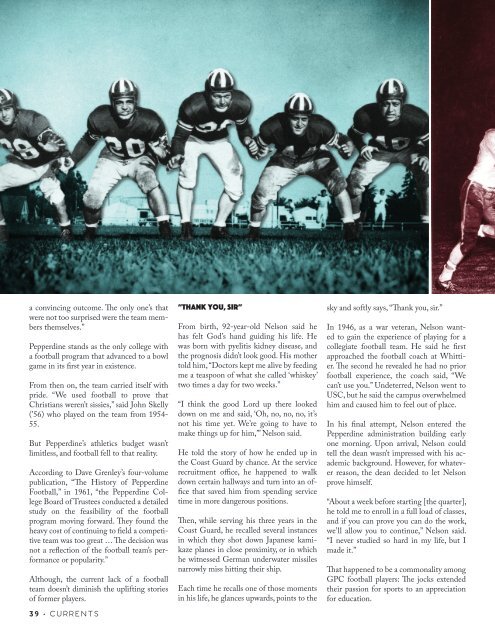Currents Magazine Winter 2015
Create successful ePaper yourself
Turn your PDF publications into a flip-book with our unique Google optimized e-Paper software.
a convincing outcome. The only one’s that<br />
were not too surprised were the team members<br />
themselves.”<br />
Pepperdine stands as the only college with<br />
a football program that advanced to a bowl<br />
game in its first year in existence.<br />
From then on, the team carried itself with<br />
pride. “We used football to prove that<br />
Christians weren’t sissies,” said John Skelly<br />
(’56) who played on the team from 1954-<br />
55.<br />
But Pepperdine’s athletics budget wasn’t<br />
limitless, and football fell to that reality.<br />
According to Dave Grenley’s four-volume<br />
publication, “The History of Pepperdine<br />
Football,” in 1961, “the Pepperdine College<br />
Board of Trustees conducted a detailed<br />
study on the feasibility of the football<br />
program moving forward. They found the<br />
heavy cost of continuing to field a competitive<br />
team was too great … The decision was<br />
not a reflection of the football team’s performance<br />
or popularity.”<br />
Although, the current lack of a football<br />
team doesn’t diminish the uplifting stories<br />
of former players.<br />
39 · CURRENTS<br />
“Thank You, Sir”<br />
From birth, 92-year-old Nelson said he<br />
has felt God’s hand guiding his life. He<br />
was born with pyelitis kidney disease, and<br />
the prognosis didn’t look good. His mother<br />
told him, “Doctors kept me alive by feeding<br />
me a teaspoon of what she called ‘whiskey’<br />
two times a day for two weeks.”<br />
“I think the good Lord up there looked<br />
down on me and said, ‘Oh, no, no, no, it’s<br />
not his time yet. We’re going to have to<br />
make things up for him,’” Nelson said.<br />
He told the story of how he ended up in<br />
the Coast Guard by chance. At the service<br />
recruitment office, he happened to walk<br />
down certain hallways and turn into an office<br />
that saved him from spending service<br />
time in more dangerous positions.<br />
Then, while serving his three years in the<br />
Coast Guard, he recalled several instances<br />
in which they shot down Japanese kamikaze<br />
planes in close proximity, or in which<br />
he witnessed German underwater missiles<br />
narrowly miss hitting their ship.<br />
Each time he recalls one of those moments<br />
in his life, he glances upwards, points to the<br />
sky and softly says, “Thank you, sir.”<br />
In 1946, as a war veteran, Nelson wanted<br />
to gain the experience of playing for a<br />
collegiate football team. He said he first<br />
approached the football coach at Whittier.<br />
The second he revealed he had no prior<br />
football experience, the coach said, “We<br />
can’t use you.” Undeterred, Nelson went to<br />
USC, but he said the campus overwhelmed<br />
him and caused him to feel out of place.<br />
In his final attempt, Nelson entered the<br />
Pepperdine administration building early<br />
one morning. Upon arrival, Nelson could<br />
tell the dean wasn’t impressed with his academic<br />
background. However, for whatever<br />
reason, the dean decided to let Nelson<br />
prove himself.<br />
“About a week before starting [the quarter],<br />
he told me to enroll in a full load of classes,<br />
and if you can prove you can do the work,<br />
we’ll allow you to continue,” Nelson said.<br />
“I never studied so hard in my life, but I<br />
made it.”<br />
That happened to be a commonality among<br />
GPC football players: The jocks extended<br />
their passion for sports to an appreciation<br />
for education.





